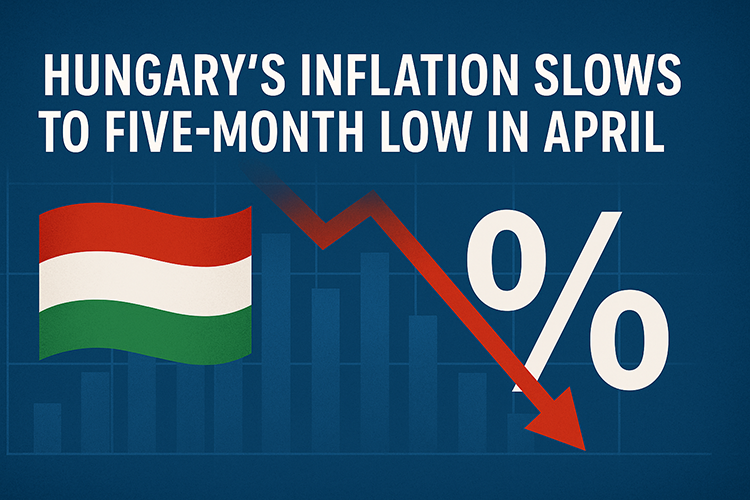Hungary’s inflation slows to five-month low in April
Inflation in Hungary eased more than expected in April, reaching its lowest level in five months as price pressures across several key categories moderated. According to the latest data from the Hungarian Central Statistical Office, the annual inflation rate slowed to 4.2% in April, down from 4.7% in March. This marks the lowest rate since November 2024 and signals a gradual cooling of consumer price growth after last year’s surge.
The decline in inflation was primarily driven by slower price increases in food, services, and consumer durables. Food inflation decelerated to 5.4% in April, compared to 7% in March, reflecting a stabilization in global food commodity prices and improving domestic supply conditions. Price growth in services also eased, dropping to 7% from 7.5% a month earlier. Meanwhile, prices for consumer durables rose by 2%, a slight moderation from the 2.1% increase in March.
However, inflationary pressures persisted in some categories. Prices for alcoholic beverages and tobacco accelerated, rising by 6.3% in April compared to 5.5% the previous month, partly reflecting recent tax adjustments. Energy prices also reversed their previous decline, with the cost of electricity, gas, and other fuels rising by 3.5%, following a 2.7% decrease in March.
On a monthly basis, consumer prices edged up by 0.2% in April, after remaining flat in March. This slight uptick was driven mainly by higher energy and alcohol prices, partially offset by seasonal declines in certain food products.
Core inflation, which excludes volatile items such as food and energy, fell to 5% in April, down from 5.7% in March. This is the lowest level in four months and indicates a broader slowdown in underlying inflationary pressures.
Economists suggest that the latest figures may strengthen expectations for further monetary easing by the Hungarian National Bank in the coming months, as inflation continues to move closer to the central bank’s target. The central bank has already implemented a series of interest rate cuts since late 2024, seeking to balance inflation control with support for economic growth amid weaker domestic demand.
“April’s inflation data confirms a continuing disinflation trend, particularly in food and services, which have been key drivers of recent price increases,” said a senior economist at Erste Bank Hungary. “However, the uptick in energy prices will need to be monitored, especially if global energy markets remain volatile.”
Despite the decline, inflation remains above pre-pandemic levels, and household budgets continue to feel the impact of elevated prices. Consumer spending has been subdued, reflecting caution amid economic uncertainty and high borrowing costs.
Looking ahead, analysts expect inflation to gradually ease further over the coming months, barring unexpected shocks in global energy or food prices. The Hungarian government has also indicated plans to maintain price controls on selected essential goods, which could help contain cost pressures for consumers.
The latest data will be closely watched by policymakers as they assess the appropriate pace of monetary policy adjustments and the outlook for domestic demand recovery in the second half of the year.
Source: KSH, TE and Bloomberg









